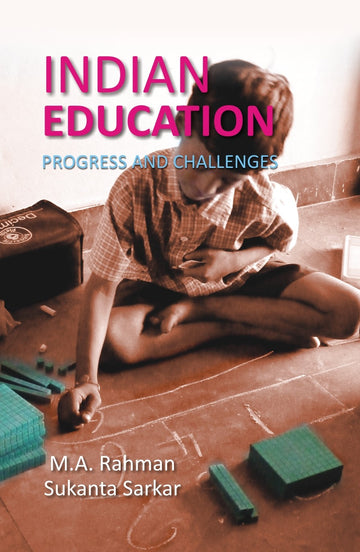Indian Education Progress and Challenges
Regular price
₹ 921
Sale price
₹ 921
Regular price
₹ 990
Unit price
Save 7%
| Item Weight | 400 Grams |
| ISBN | 978-9351280903 |
| Author | Sukanta Sarkar/ M A Rahman |
| Language | English |
| Publisher | Kalpaz Publications |
| Pages | 348 p |
| Book Type | Hardbound |
| Dimensions | 25 X 15 X 5 |
| Publishing year | 2014 |
| Edition | 1st |
| Return Policy | 5 days Return and Exchange |

Indian Education Progress and Challenges
Product description
Shipping & Return
Offers & Coupons
About the book:- Education in it's general sense is a form of learning in which the knowledge, skills, and habits of a group of people are transferred from one generation to the next through teaching , training, or research. Systems of schooling involve institutionalised teaching and learning in relation to a curriculum, which itself is established according to a predetermined purpose of the schools in the system Schools systems are sometimes also based on religions, giving them different curricula. Universalisation of upper primary education in India is normally discussed in terms of enrolling and retaining all children belonging to the group 11 to 14. The present book highlights, considers and discusses various contemporary issues of Indian education. It is hoped that the present edition of this book will be beneficial to all concerned of the society, in general, students, lawyers, advocates, academicians, human rights institutions, researchers and NGOs working in education field, in particular. Contents of this book are Primary Education in India: Progress and Challenges; Progress of Upper Primary Education in India : A Comparative Study of Pre and Post Reform Period; Employee Stress Management in Private School: An Analysis; Development of Primary Education among Scheduled Tribes in Andhra Pradesh; A Study of Academic Attainment among Class I Students of Himachal Pradesh; Mid-day Meal Programme in India: An Overview; Relationship between Pre-school Education with Cognitive and Language Development of Pre-school Children : An Analysis; Social Exclusion of Scheduled Caste Children from Primary Education in Tripura, Secondary Education in India : An Overview; Secondary Education : Progress and Challenges; Attitude of teachers and peers of mentally retarded children towards mental retardation : A Study in Assam; Higher Education in India : An Overview; Quality Assurance of Higher Education in India; Information Communication Technology and Higher Education; Digital Library: A New Invention in Research and Study; Adult Education in India : An Overview; Distance Education in India : An Overview; Community Participation and Local Governance in Education; Sarva Shiksha Abhiyan in India: Success and Constrains; Right to Education for Person with Disabilities ; Women Education in India: Challenges and Progress; Tribal Education in India: An Overview ; Environmental Education : Needs and Progress; Sex Education : Needs and Challenges and Knowledge Society and Information Management: A Study of Contemporary Socioeconomic Issues and Challenges., About The Author:- Mohammed Ataur Rahman is the Director of Centre for Global Environmental Culture (CGEC) and Professor of College of Agricultural Sciences of IUBAT-International University of Business Agriculture and Technology, Dhaka, Bangladesh. Graduated from the University of Dhaka Professor Rahman obtained M.Sc. from the same university and also from the University of Landon with Post Graduate Diploma (Die) from the Imperial College, London. He did PhD from California, USA. He is a Plantation Crop, Forestry and Agriculture Specialist; Co-ordinators of WWOOF Bangladesh and Regional Centre of Expertise (RCE) Greater Dhaka acknowledged by UNU-IAS. He published five books on Plantation Crops and Organic Farming Series and one on Traditional Knowledge and Biodiversity published by United Nations University, Japan. At present, he is working on Education for Sustainable Development with United Nations University Institute of Advance Studies (UNU-IAS); Global Environment Change and Sustainable Development with International Geosphere and Biosphere Program (IGBP) and Asia Pacific Net-Work (APN). Sukanta Sarkar is working as Assistant Professor in Faculty of Management Studies, ICFAI University, Agartala Tripura, India. He did MA and PhD in Economics. He qualified UGC-NET Exam in December/2006. Currently he is Post-Doctorate fellow in Berhampur University, Odisha. He presented many research papers in various seminars, conferences and symposiums. Various research papers have been published in foreign and national journals. He also previously worked as visiting lecturer in National Institute of Technology, Agartala & Tripura University. He has research interest in various top ics like agricultural crisis, rural development, women empowerment, sustainable development and social problems. Contents:- PART:1-PRIMARYEDUCATION 13 15 17 1 Primary Education in India:Progress and Challenges Prof N.C. Pendse andDr. Sukanta Sarkar 25 • Introduction • Concept • Importance of Primary Education • Primary Education in India • Millennium Development Goals • Challenges • Conclusion 2. Progress of Upper Primary Education in India: A Comparative Study of Pre and Post Reform Period Prof D. Pu/la Rao 35 • Introduction >Present Structure ofSchool Education in India • Progress of Upper Primary Education >Student-teacher Ratio in Upper Primary Schools • Conclusions 3. Employee Stress Management in Private School: An Analysis Ms. Sacbin Sacbdeua 43 • Introduction s Stress: Hans Selye's General Adaptation Syndrome >Alarm Reaction • Resistance s Exhaustion s Types of Stressors • Effects of Stress • Result and Discussions s Limitations >Future Research Directions 4. Development of Primary-Education among Scheduled Tribes in Andhra Pradesh ~D~~ ~ • Introduction • Policies and Programmes Objectives and Methodology • Disparities in Literacy Ratesbetween Scheduled Castes and All Communities • Enro llment of SC Children versus All Children in Primary Stage • District-wise Enrollment of SC Children vers us All Children in Primary Stage > Conclusions 5. A Study ofAcademic Attainment among Class I Students ofHimachal Pradesh Dr. Satish ChandBhadwal andDr.A nil KumarAgnihotri 57 • Introduction s Objectives of the Study >Hypothesis of the Study >Analysis and Interpretation of Data > Discussion 6. Mid-day Meal Programme in India: An Overview Dr. MohammadAftarA/am 70 • Introduction >What is Mid-day Meal Scheme? • Importance of the Scheme • Mid-day Meal Scheme: Progress > Financing of the Scheme > Effects of Mid-DayMeal Scheme> Criticism of the Scheme> Conclusion 7. Relationship between Pre-school E ducation with Cognitive and Language Development of Pre-school Childr en:An Analysi s Miss Fou:dJaQadiri and DrSarika Manhas 78 • Introduction >Research Methodology >Results and Discussion >Conclusions 8. Social Exclusion of Scheduled Caste Childr en from Primary E ducation in Tripura D¢@~rB~M ~ • In troduc tion >Significance of the Study> Overview of Schedule Caste in Tripura • Analytical Framework to Address Social Exclusion in Prima ry Education • Overview of Education in Tripura and the Extent of Social Exclusion of Scheduled Caste Children> Policy Implications and Conclusions • Special provisio ns /Incentives for Education of SCs in Tripura PART II - SECONDARYEDUCATION 9. Secondary Education in India: An Overview Prof.B.K. Panda and Dr. Sukanta Sarkar 101 • Introduction> What is Secondary Education? • Importance of Secondary Education> Secondary Education: Global Perspectives s Secondary Education in In dia >Board of Secondary Education in Ind ia • Quality and Efficiency of Secondary Education in India > Open Schooling• Challenges in Secondary Education> Conclusion 10.Secondary-Education: Progress and Challenges Prahe/i~ Roy 118 • Introduction >Concept> Progress ofSecondary Education in India >Rashtriya Madhyamik Shiksha Abhiyan • Public Private Partnerships >Challenges before the Secondary Education s Conclusion 11. Attitude of teachers and peers ofmentally retarded children towards mental retardation: A Study in Assam N~~n TI~d ll7 • Introduction > Significance of the Study >Purp ose of the Study >Questions of the Study> Materials and Metho ds> Proc edure of data collection > Result • Discussion and Conclusions s Limitation s and Future PARTIII -HIGHEREDUCATION ll. Higher Education in India: An Overview Prof R Prasad and Dr. Sukanta Sarkar • Intro duction • What is Higher Educa tio n? • 141 Importance of Higher Education • Higher Education in India • High Education and Women • Quality assurance in India' High Education and Reservation' Public /Private Partnership' Shortcomings of Higher Education in India' Higher Education and Human Rights • Conclusion and Suggestions 13.Quality Assurance ofHigher Education in India Prabeliea Roy 153 • Introduction • Pre-Independence India • Higher Education after Independence' Quality of Higher Education in India' Technical Education • Private Participation in Higher Education> Propose Legislation> Constrains • Conclusion 14.Information Communication Technology and High.er Education Prof Md. Ataur Rahman, andDr. Sukanta Sarkar 167 • Introduction> What is Teacher Education? • ICT and Teacher Education: Global Perspective> ICT and Teacher Education> Growth of ICT Education in India> Significant of ICT in Teacher Ed ucation ' Concluding Observations PART IV - DIGITAL LIBRARY 15.Digital Library:ANew Invention in Research and Study Prof. Farrana Alim 183 • Introduction' What is Digital Library? • Digital Library: Global perspectives • Digital Library in India s Open Course Ware• Needs s Challences • Conclusion 16.Building an Effective Digital Library in Digital Era Dr.Manaswini Patra 198 • Introduction > Need of Library Automation > Problems of Libraries and Information Centers Access • Major Library Software's Available • Library Automation Activities: Global Perspectives' Library Automation Activities in India' Importance of Digitations • Digitization Process s Major Challences • Conclusion PART V - MISCELLANEOUS 17.Adult Education in India: An Overview Dr. P.K. Pandey 211 • Introduction > What is Adult Education? • Significance of Adult Education • Principles of Adult Learning' Adult Education: Global Perspectives • Adult Education in India' Conclusion 18.Distance Education in India: An Overview Dr.N C Patnaik 220 • Introduction > What is Distance Education? • Distance Education in Ind ia • Quality Assurance' Distance Education Council' DEC of IGNOU Dissolved' Conclusion 19.Community Participation and Local Governance in Education Dr. RaviSaini& Ms. Ren« Pacbauri 233 • Introduction • Role of Community Participation • Role of Local Government> Mechanisms for Encouraging Partic ipation >Scheme of State and Central Government in Education> Conclusion 20.Sarva Shiksha Abhiyan in India: Success and Cons trains Dr. P.K Ghoshal 244 • Introduction > Concept • Importance of Sarva Shiksha Abhiyan Scheme • Components of Sarva Shiksha Abhiyan Scheme > Sarva Shiksha Abhiyan in India: Progress ' Financial Norms under Sarva Shiksha Abhiyan Scheme >Sarva Shiksha Abhiyan Scheme: Constrains' Conclusion 21. Right to Education for Person with Disabilities Dr. Rak eshJoshi 253 • Introduction • X1hat is Disability? • Right to Education' International Human Rights Law • Legal Mechanism: Indian Perspectives • Right to Education Act, 2009 • Conclusion 22.Women Education in India: Challenges and Progress Dr. S.K. Chaudhmy 261 • Introduction ' Importance of Women Education ' Disadvantages ofWomen Education > Women Education: Progress • Efforts of Women Education • Co nst rains of Women E ducatio n • Education and Human Rights • Conclu sion 23.Tribal Education in India:An Overview Dr. P.K Pandey 272 • Introduction ' X1ho are Tribal's? • Tribal Community in India ' Tribals in Tripura • Tribal Education ' Status of Tribal Women ' Factors affecting Tribal E ducation' Constitutional Previsions and Government Initiatives • Conclusion 24.Environmental Education:Needs and Progress DrA ni! Chandra Basak 283 • Introduction ' Concept Importance o f Environmental Education • Environmental Education in India: Progress >Challenges for Environmental Educators' Conclusion 25.Sex-Education:Needs and Challenges .Amitra SudanChakraborry 292 • Introduction ' What is Sex-Education? • Importance of Sex-Education • Sex-Education: Global Perspectives ' Sex-Education in India ' Conclusion 26.Knowledge Society and Information Management: A Study of Contemporary Socio-Economic Issues and Challenges Dr. Manzoor Hussain 300 • Introduction ' Nature and Scope ' Theoretical Orientations ' Knowledge Society,Information Management and Socio-Economic Issues ' Conclusion l:l. Value Education: Importance in Secondary Education Meenu 311 • Introduction» Importance of Secondary-Education> Meaning of ValueEducation> Different Types of Values s Importance of Value-Education in Schools- Aims of Values-Education s Causes of Value Degeneration >Impact of Ero sion of Values among Adolescents > Role of Education for the inculcation of Values • Strategie s to Promote Values for School Children • Conclusion 28.Role ofManagement Education for Sustainable Society and Sustainable Development: Limits and Possibilities Dr. RajibMallik 321 • Introduction • Methodology >Analysis and Discussion >Conclusion Biobliography 328 Index 341 --------- The Title 'Indian Education Progress and Challenges written/authored/edited by Sukanta Sarkar/ M A Rahman', published in the year 2014. The ISBN 9789351280903 is assigned to the Hardcover version of this title. This book has total of pp. 348 (Pages). The publisher of this title is Kalpaz Publications. This Book is in English. The subject of this book is Education. Size of the book is 14.34 x 22.59 cms Vol:-
- Sabr– Your order is usually dispatched within 24 hours of placing the order.
- Raftaar– We offer express delivery, typically arriving in 2-5 days. Please keep your phone reachable.
- Sukoon– Easy returns and replacements within 5 days.
- Dastoor– COD and shipping charges may apply to certain items.
Use code FIRSTORDER to get 5% off your first order.
You can also Earn up to 10% Cashback with POP Coins and redeem it in your future orders.








